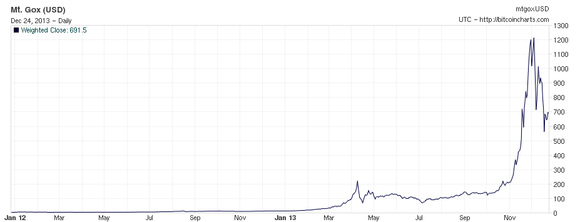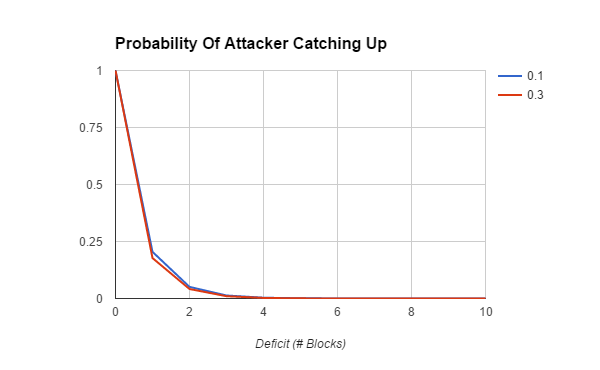Bitcoin: A Peer-to-Peer Electronic Cash System
Eric Scrivner (@etscrivner)
With lots of help from
Andrew Len (@FwdSlashEarl)
Outline
Brief History of Bitcoin
Go Over The Paper
Why A Decentralized Digital Cryptocurrency?
Why Cryptocurrency?
Allow Individuals To Transact Directly With Each Other
Instantaneous International Money Transfers
Micropayments: Potential To Make Fine-Grained, Usage-Based Payments Feasible
Decentralized Contracts With Built-in Arbitration
Decentralized Digital Identity (Namecoin)
Provide An Alternative Currency To Regions With Unstable Economies
And That's Just The Tip Of The Iceberg...
Brief History
Pre-History
1997 - Adam Back's Hashcash - introduces the idea of "hard to create easy to verify" proof of work as a way to fight spam.
1998 - Wei Dai's b-money proposal - a protean form of the ideas in bitcoin - namely proof of work as a means of creating digital money. Implementation described is unworkable as it requires an unjammable channel.
2008 Bitcoin Paper Released

2009 Bitcoin Client Released, First Bitcoins Mined

May 22, 2010 - Programmer Pays 10,000 BTC for 2 Papa John's Pizzas

$2,300,000 USD
2011 - Satoshi Nakamoto "moves on to other things"
2011 - 2014 - The Bubble Years
July 2011 - Peaked at $31


Nov 2013 to Jan 2014 - Peaked at $1000 then crashed
2014 - Present - Price Drop, High Volatility, Protocol Needs Work - Bitcoin Forked




Current State - The Honeymoon Is Over
The devil is in the details, and there's a lot of work to be done.
The Paper
The Problem With Trusted Third Parties
Kick The Security Can Down The Road

Expensive

Requires Everyone To Trust Same Party

Single Point of Failure

TL;DR:
If you're designing a secure protocol, you provide a stronger guarantee if you don't rely on a Trusted Third Party (TTP)
So...What's The Alternative?
Use "cryptographic proof instead of trust"
Replacing Trust With Cryptographic Proof
Whatever System We Make Needs To Have Transferrable Ownership
This Means
A Concept Of Identity
A Means Of Telling Who Owns Which Coins

Bits are trivial to reproduce so...
What's To Stop The Owner From Transferring Ownership Of The Same Coin To Many People?
Traditional Solution: Use A Digital Mint

Uh oh!
Trusted Third Party
The Solution
"The only way to confirm the absence of a transaction is to be aware of all transactions...To accomplish this without a trusted party, transactions must be publicly announced [1], and we need a system for participants to agree on a single history of the order in which they were received"
The Blockchain
The Idea In Abstract
Collectively construct multiple histories of all the transactions that have ever occurred. The winning history (at any moment) is the one with the most cryptographic proof behind it.
Concretely: Mining


Building A Distributed History
- The first block ("Genesis Block") is hard-coded into the software.

Building A Distributed History
- Nodes listen for new transactions and append them to the current block they're trying to mine.
- The incentive to mine is mainly for the reward. Some people mine blocks with no transactions, which are still considered valid.

Building A Distributed History
- Blocks are "mined" by finding a number (nonce) that produces SHA-256(nonce + prev block hash + merkle roots of all transactions in block) with a specified number of leading zero bits ("block difficulty").

Building A Distributed History
- The first node to find such a nonce "wins", and can publish all of the transactions in their block to the network.
- Other nodes stop working on their block and begin work on new blocks.
- The winning miner gets a fresh batch of new bitcoins as a reward for taking on the work of mining.
If We Leave And Rejoin How Do We Know What Happened?
We simply accept the longest valid proof-of-work chain.
Why?
Because a proof-of-work chain is insanely hard to forge so long as the network contains mostly honest miners.

We've Found A Decentralized Solution To The Double Spending Problem!
That's it for now, but there's still a lot more to bitcoin...
Questions?
Bitcoin: A Peer-to-Peer Electronic Cash System
By Eric Scrivner
Bitcoin: A Peer-to-Peer Electronic Cash System
- 2,220